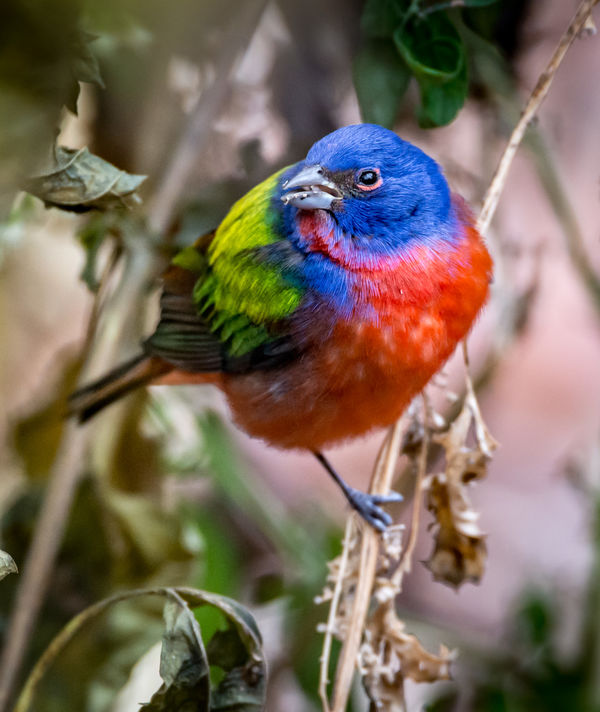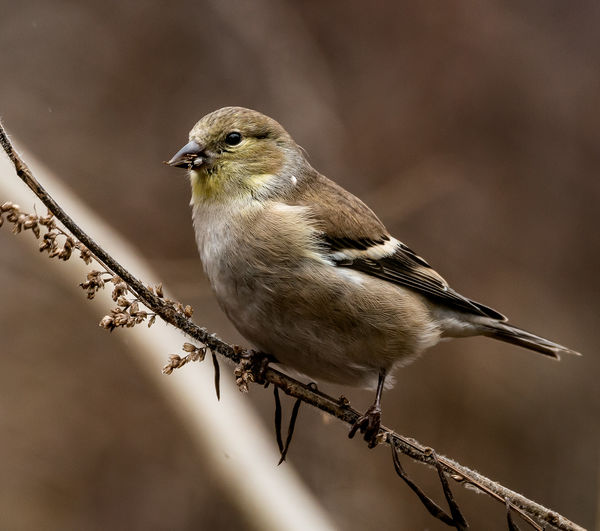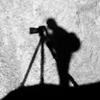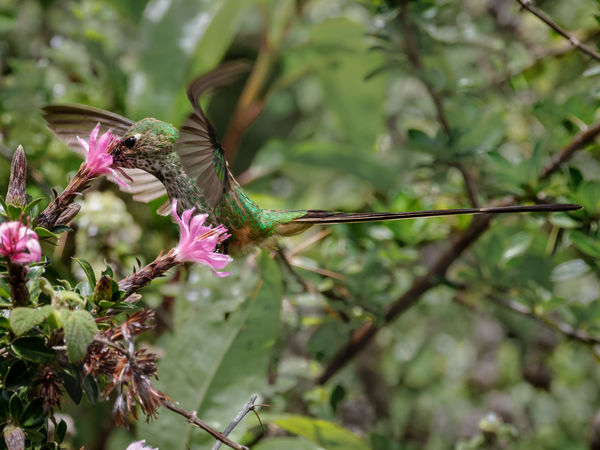How do you guys do it?
Nov 20, 2016 10:37:25 #
I see amazing images posted here of relatively small subjects such as birds. The aparent distance from camera to subject and the incredible sharpness and detail in the images impresses me. How do you guys and gals do it? Very long telephoto lenses or cropping?
Nov 20, 2016 10:41:40 #
Both. I use a 150-500mm Sigma and often crop photos I have taken at those focal lengths.
Nov 20, 2016 11:29:46 #
Nov 20, 2016 12:48:17 #
Bugfan
Loc: Toronto, Canada
It would take too long to answer that question but I can give you a few suggestions.
First of all you need the lens. In my macro work I have six macro lenses, extension tubes and a bellows as well as a macro flash and a ring flash. You don't need all that though, a single lens on a bright sunny day is all you really need. In my wild life work I use a Nikon 70-200 mm f2.8 lens or a Sigma 150-500 mm.
Whatever you're after it's vital that you have a tripod that is solid. I have a light one that has a hook at the bottom of the column. I place a plastic grocery bag fill of rocks or sand on that hook making the tripod solid like the rock of gibraltar. Sometimes you can work hand held, I do that a lot but sometimes the tripod is the only way to get a sharp image.
When it comes to small stuff I have a variety of flash units but I don't use them that often. Instead I have a mirror mounted on a light stand that I take into the bush. I then set this up to any height and aim sunlight exactly where I need it to get the image effect I want. It's a cheap solution to having intense natural light.
With widllife lighting is often a serious issue but carrying a powerful on camera flash sometimes does the trick.
So that's a bit on the gear side. What is most important however is to get educated and to practice. You can't learn to ride a bicycle by reading a book. You have to get on the bike and just fall off until you find the balance. That's the same with taking super pictures. The more you do it, the more you practice, the more you stop to understand why an image came out well or didn't come out well, the sooner you will master the art of capturing the amazing pictures you're admiring.
My favourite question has always been "Why". Why did that picture come out so super? Why did this image look so terrible? How can I slow down my subject? Why is my subject skittish, is it something I'm doing? The "why" question and the "how" question both help you to gradually understand what you need to do with your camera to capture the magic images.
Be prepared to also learn patience if you haven't already. If you want to do wild life or macro you're going to need a lot of it.
Oh yes, and let the subject come to you. I've often seen an amateur bounding through the bush to capture a picture of a butterfly. Don't do that. It scares the hell out of the insect so it will never stop for you and it's got a lot more endurance than you will ever have so there's no way you can catch it. A better approach is to sit down comfortably and just watch your subject. Where does it land? How long does it stay there? Why does it select that particular place? These questions will then tell you where you need to sit to get the picture and sure enough it will then come to you.
Over the long term I started simple and as I attempted to get better I encountered many challenges. Sometimes it was necessary to practice more and other times it was the need for a piece of gear that would solve the issue. Ignore the advertising that always tells you if you owned that new widget you will not only take amazing pictures but perhaps also look impressive to the opposite sex. Clearly define your problem and then go find the solution you need. This way you have gear that meets your needs and solves your problems in the longer term. And as you solve the problems you not only have the tools to make incredible images, you also have the skills and the understanding it takes to know how to use the tools effectively.
It's been an interesting adventure for me. I've been taking pictures for fifty years now. I never realized just how far I came until I started to mentor one or two proteges at a time. To my surprise I fire off two or three pictures that end up looking amazing while my proteges struggle with their gear for endless minutes only to capture a mediocre image most of the time. That's what taught me the power of patience and practice. Many eventually get better than me because they kept practicing and of course in the process I learn a bit more too.
Good luck!!
First of all you need the lens. In my macro work I have six macro lenses, extension tubes and a bellows as well as a macro flash and a ring flash. You don't need all that though, a single lens on a bright sunny day is all you really need. In my wild life work I use a Nikon 70-200 mm f2.8 lens or a Sigma 150-500 mm.
Whatever you're after it's vital that you have a tripod that is solid. I have a light one that has a hook at the bottom of the column. I place a plastic grocery bag fill of rocks or sand on that hook making the tripod solid like the rock of gibraltar. Sometimes you can work hand held, I do that a lot but sometimes the tripod is the only way to get a sharp image.
When it comes to small stuff I have a variety of flash units but I don't use them that often. Instead I have a mirror mounted on a light stand that I take into the bush. I then set this up to any height and aim sunlight exactly where I need it to get the image effect I want. It's a cheap solution to having intense natural light.
With widllife lighting is often a serious issue but carrying a powerful on camera flash sometimes does the trick.
So that's a bit on the gear side. What is most important however is to get educated and to practice. You can't learn to ride a bicycle by reading a book. You have to get on the bike and just fall off until you find the balance. That's the same with taking super pictures. The more you do it, the more you practice, the more you stop to understand why an image came out well or didn't come out well, the sooner you will master the art of capturing the amazing pictures you're admiring.
My favourite question has always been "Why". Why did that picture come out so super? Why did this image look so terrible? How can I slow down my subject? Why is my subject skittish, is it something I'm doing? The "why" question and the "how" question both help you to gradually understand what you need to do with your camera to capture the magic images.
Be prepared to also learn patience if you haven't already. If you want to do wild life or macro you're going to need a lot of it.
Oh yes, and let the subject come to you. I've often seen an amateur bounding through the bush to capture a picture of a butterfly. Don't do that. It scares the hell out of the insect so it will never stop for you and it's got a lot more endurance than you will ever have so there's no way you can catch it. A better approach is to sit down comfortably and just watch your subject. Where does it land? How long does it stay there? Why does it select that particular place? These questions will then tell you where you need to sit to get the picture and sure enough it will then come to you.
Over the long term I started simple and as I attempted to get better I encountered many challenges. Sometimes it was necessary to practice more and other times it was the need for a piece of gear that would solve the issue. Ignore the advertising that always tells you if you owned that new widget you will not only take amazing pictures but perhaps also look impressive to the opposite sex. Clearly define your problem and then go find the solution you need. This way you have gear that meets your needs and solves your problems in the longer term. And as you solve the problems you not only have the tools to make incredible images, you also have the skills and the understanding it takes to know how to use the tools effectively.
It's been an interesting adventure for me. I've been taking pictures for fifty years now. I never realized just how far I came until I started to mentor one or two proteges at a time. To my surprise I fire off two or three pictures that end up looking amazing while my proteges struggle with their gear for endless minutes only to capture a mediocre image most of the time. That's what taught me the power of patience and practice. Many eventually get better than me because they kept practicing and of course in the process I learn a bit more too.
Good luck!!
Nov 20, 2016 13:59:21 #
watebo wrote:
I see amazing images posted here of relatively small subjects such as birds. The aparent distance from camera to subject and the incredible sharpness and detail in the images impresses me. How do you guys and gals do it? Very long telephoto lenses or cropping?
Like these?
Nov 20, 2016 15:36:32 #
watebo wrote:
I see amazing images posted here of relatively small subjects such as birds. The aparent distance from camera to subject and the incredible sharpness and detail in the images impresses me. How do you guys and gals do it? Very long telephoto lenses or cropping?
Both*, plus working on getting closer either by getting them used to me being there or using some kind of concealment. With hummingbirds just sitting still near a feeder will often work, they get used to you. Then move slowly and smoothly when you raise the camera to take the pictures since fast-sudden movement sets off their reflexes to dodge and run.
*I own 100-400, 150-600 and 180 macro with a 1.4X extender and on my 7DII that gives even more reach.
Nov 20, 2016 15:42:46 #
watebo wrote:
I see amazing images posted here of relatively small subjects such as birds. The aparent distance from camera to subject and the incredible sharpness and detail in the images impresses me. How do you guys and gals do it? Very long telephoto lenses or cropping?
W, welcome to the Hog !
I think we just had this exact same post with the exact same title! Maybe someone can link it for you?!
Again, welcome!
SS
Nov 20, 2016 16:02:17 #
watebo wrote:
I see amazing images posted here of relatively small subjects such as birds. The aparent distance from camera to subject and the incredible sharpness and detail in the images impresses me. How do you guys and gals do it? Very long telephoto lenses or cropping?
Long lenses are preferable to cropping, but most people use both for small birds. I'm not sure how you determined the 'apparent distance from camera to subject', but some birds are much more shy than others, and some completely ignore you. As to the sharpness, that is a combination of practiced skill and fast shutter speeds.
Nov 20, 2016 16:03:39 #
watebo wrote:
I see amazing images posted here of relatively small subjects such as birds. The aparent distance from camera to subject and the incredible sharpness and detail in the images impresses me. How do you guys and gals do it? Very long telephoto lenses or cropping?
I'm not sure if I qualify as one of the "guys", but here is my 2 cents. There are two essentials to great bird shots: proximity and light. The former can be achieved by physically closing the distance between camera and bird or by the use of long lenses. The latter can be achieved by use of natural and/or artificial sources and a lens that will open wide enough to provide relative fast shutter speeds while using the lowest ISO possible. Send me a pm if you wish and I will elaborate on my camera settings and technique. Otherwise, good luck.
Nov 20, 2016 21:13:21 #
ben5586
Loc: California USA
watebo wrote:
Sometimes you just get lucky. Sometimes the subject hangs out long enough for you to get a couple shots.This was taken in my backyard, as soon as I got a couple shots he flew away.I see amazing images posted here of relatively small subjects such as birds. The aparent distance from camera to subject and the incredible sharpness and detail in the images impresses me. How do you guys and gals do it? Very long telephoto lenses or cropping?
D3200 with 55-200mm lens
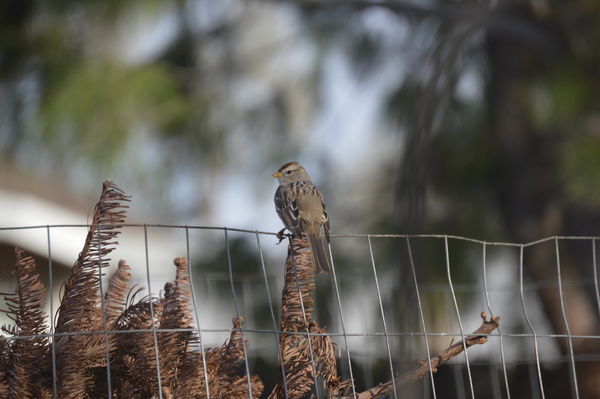
Nov 21, 2016 05:49:42 #
billnikon
Loc: Pennsylvania/Ohio/Florida/Maui/Oregon/Vermont
watebo wrote:
I see amazing images posted here of relatively small subjects such as birds. The aparent distance from camera to subject and the incredible sharpness and detail in the images impresses me. How do you guys and gals do it? Very long telephoto lenses or cropping?
I use a Nikon 200-500 on a crop D 500 with group auto focusing (using center spot), f6.3, con. auto focus, at minimum of 1/1500 sec. hand held. My birds are usually within 50 yards from me.
Nov 21, 2016 06:03:29 #
Get as close as you can to your subject. The more the subject fills the frame, the sharper your finished photo will be.
Nov 21, 2016 07:34:29 #
Nature Birding is not easy,the birds smart, I use my Sigma 150-600mm lens, I also do post processing if needed. Cleaning unwanted objects, sharpness and cropping.
If I find specific birds at one location I keep going back several times.I have not used a blind in several years, they can be interesting. I have a Canon 7D Mark ll, the modes I use is Manual TV, AV.
If I find specific birds at one location I keep going back several times.I have not used a blind in several years, they can be interesting. I have a Canon 7D Mark ll, the modes I use is Manual TV, AV.
Nov 21, 2016 08:09:07 #
Heather Iles
Loc: UK, Somerset
Gene51 wrote:
Like these?
Beautiful photos gene51, now tell us how it was done please.
Nov 21, 2016 08:11:39 #
Heather Iles
Loc: UK, Somerset
Bugfan wrote:
It would take too long to answer that question but... (show quote)
If you want to reply, then register here. Registration is free and your account is created instantly, so you can post right away.



